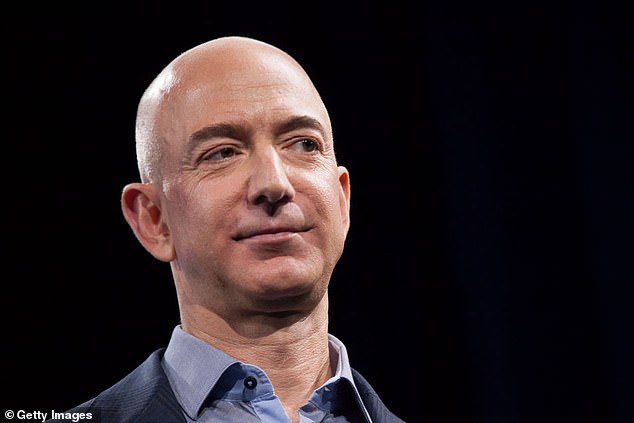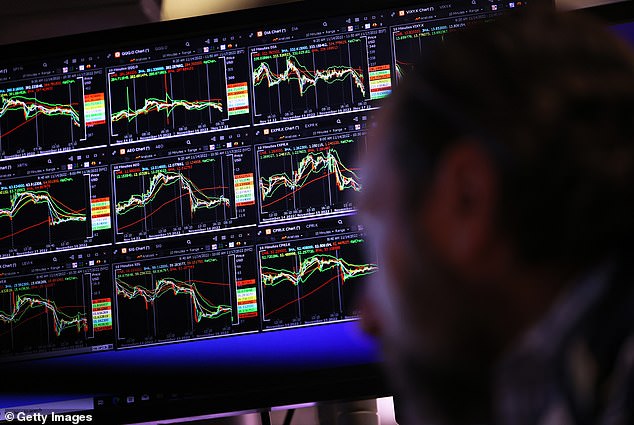The stock market is going up, but executives aren’t buying shares in their companies.
Tech founders including Jeff Bezos and Mark Zuckerberg have sold billions of dollars worth of stock in their companies in recent months.
JPMorgan Chase CEO Jamie Dimon, meanwhile, withdrew $1 million from the bank earlier this year, putting $183 million into the fund.
The behavior of company executives and board members, who should be well informed about their businesses, is seen by some as a sign of the future performance of the stock market as a whole.
Experts are warning that the sale of executives means that companies are struggling with the economic downturn, The Wall Street Journal reported.

Tech founders including Jeff Bezos (pictured) have sold billions of dollars worth of stock in their companies in recent months.
‘Internal trade shows a very strong aggregate future return, Nejat Seyhun, a professor at the Ross School of Business at the University of Michigan, told the outsider.
‘The fact that they are below average shows that future returns will be below average again.’
Of all US companies with an executive or director trading in July, only 15.7 percent reported a net purchase of the company’s stock, according to InsiderSentiment.com.
This is the lowest level in the last decade.
CEOs and directors of US companies bought $2.3 billion of their companies this year through September, data from the research firm, The Washington Service, showed.
This was also the lowest amount at any time since 2014. During the same period last year, executives bought $3 billion in their own funds.
Bezos released $10.3 billion worth of Amazon stock, Zuckerberg sold $2.1 billion in Meta stock, while Michael Dell, CEO of Dell Technologies, sold $5 billion, according to The Washington Service.
Meanwhile, shares of all three companies are up 2 percent this year.
The S&P 500, meanwhile, had its best first nine months of the year since 1997.
Seyhun, who is a consultant for InsiderSentiment.com, told the Wall Street Journal that he believes that companies are struggling with the recession, which will lead to a significant drop in prices.
Recent economic data has been positive, with inflation starting to cool and a blockbuster jobs report earlier this month reassuring investors that the labor market is on solid ground.
But some economists are more pessimistic about hidden signs of distress.
JPMorgan CEO Dimon said earlier this year that he worries there are still a number of inflationary forces on the horizon.
He said the high deficit and increased government spending will add pressure to the economy which is still reeling from the impact of high inflation.
In May, he said he was pessimistic about risks to the economy and thought bank stocks were overpriced, The Wall Street Journal reported.
Long-time investor Warren Buffett’s stockpiling of savings in recent months has also puzzled some observers.

Zuckerberg sold $2.1 billion in Meta stock, according to The Washington Service

The CEO of JPMorgan Chase, Jamie Dimon, said earlier this year that he is concerned that there is still a plan for inflation.

Some experts are warning that higher sales mean that companies are worried about the recession, even as the stock market is higher.
Buffett’s Berkshire Hathaway reduced its stake in Apple and Bank of America, selling $5.4 billion in the bank in a few months.
Berkshire has long been bullish on financial companies, leading some analysts to see Buffett’s sale as a clear warning that tough times could lie ahead.
‘Investors should take note,’ David Harden, CEO and chief investment officer of Summit Global Investments, told The Wall Street Journal.
‘I don’t think you can say he’s trying to time the market and look for idols, but I think he’s saying, “This is too much, and I value money more than I value this money.”‘
But not all investors believe that insider trading is a good sign for the future of the stock market.
Some say investors may issue stocks to diversify their portfolios or free up some cash, not as a result of a negative view of a particular stock.
In April, JPMorgan said Dimon’s stock disposal, which was the first in 19 years, was for ‘financial diversification and tax planning.’
#implications #insider #trading #Warren #Buffett #Mark #Zuckerberg #Jeff #Bezos #economy